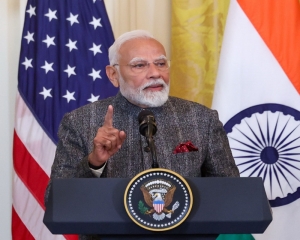India’s economy is set to lead global growth, requiring right policies in the upcoming budget to maintain momentum
India’s growth story is going strong despite interruptions in the global markets. Indian economy has maintained its momentum and will continue to do so in the next two years. According to the January 2025 edition of the World Bank’s Global Economic Prospects report, India is poised to retain its position as the fastest-growing major economy, with an impressive projected growth rate of 6.7 per cent for both FY26 and FY27. This remarkable trajectory not only surpasses global growth forecasts of 2.7 per cent but also cements India’s status as a critical player in the global economic landscape. India’s robust economic performance is underpinned by several key factors. The services industry continues to be a cornerstone of India’s economy, contributing significantly to GDP and job creation. IT services, financial technology, and healthcare have been pivotal in driving growth. Government initiatives like ‘Make in India’ and the Production-Linked Incentive (PLI) schemes have helped manufacturing, fostering innovation and attracting both domestic and foreign investments. Investments in infrastructure, including roads, railways and digital connectivity, have bolstered economic activity and enhanced productivity.
India’s economic ascent is noteworthy in a global context where growth remains tepid. With China’s growth slowing to an estimated 4 per cent next year, India’s consistent expansion underscores its growing prominence. The International Monetary Fund’s World Economic Outlook aligns with the World Bank’s projections, estimating India’s growth at 6.5 per cent for 2025 and 2026, further reinforcing the nation’s stable economic fundamentals. Despite its impressive performance, India faces a set of challenges that demand attention, especially as the Union Budget for FY26 approaches. While growth is robust, the need to create adequate job opportunities for India’s burgeoning youth population remains pressing. Addressing structural unemployment will be crucial to ensuring inclusive growth. Rising global commodity prices and domestic supply chain constraints pose risks to price stability. Effective monetary and fiscal measures are required to contain inflation without stifling growth. With increased spending on infrastructure and social welfare, maintaining fiscal discipline will be a balancing act for policymakers. The agriculture sector, a backbone of the Indian economy, continues to face challenges such as erratic monsoons, low productivity, and market inefficiencies. Comprehensive reforms are needed to modernise and stabilise this sector. Geopolitical tensions, trade disruptions, looming tariff hike in the US and climate change are external risks that could impact India’s growth trajectory. Strengthening economic resilience against these uncertainties is imperative. As Nirmala Sitharaman prepares to unveil the Budget, she must focus on addressing these challenges to keep India’s growth momentum. Prioritising investments in education, healthcare, and skill development will ensure that the benefits of growth are widely shared.



























